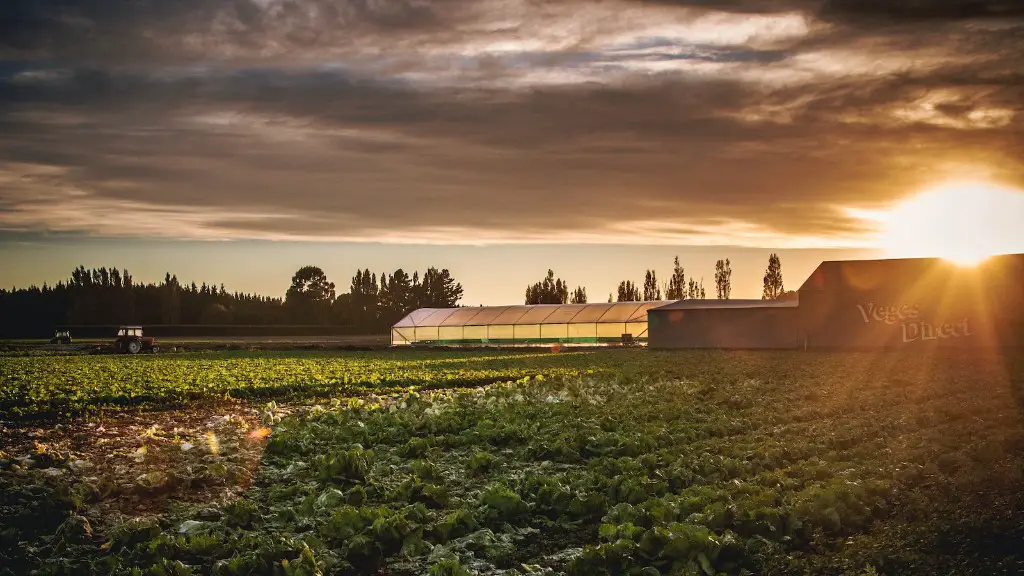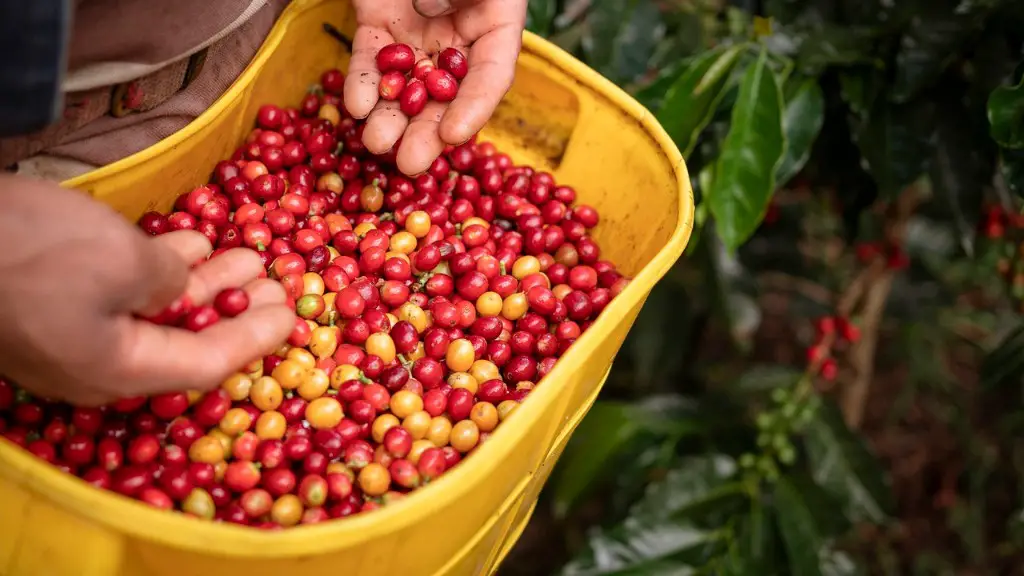There is no doubt that the environment has a huge impact on agriculture. This can range from the climate and weather conditions to the quality of soil and water. Farming is immensely dependent on the environment, as it affects the yield, quality and efficiency of agricultural production. Thus, it is essential for farmers to understand how environmental factors impact their farming decisions.
Temperature can have a major influence on crop growth and development, as crops have certain climatic requirements in order to develop normally. For example, extreme temperatures can slow down or stop growth, resulting in lower yields. Weather patterns, such as monsoons and droughts, can also impact agriculture, as farmers need the right amount of water for crops to grow. In addition, the presence of pests, such as insects, rodents and weeds, can damage crops, resulting in yield loss. Therefore, it is important for farmers to be aware of such environmental factors in order to protect their crops.
Soil quality can play a major role in determining the success of a crop. The quality of the soil affects the availability of nutrients for the plants, which can ultimately affect the growth rate and yields. Poor soil quality can mean that there is less water availability, leading to the plants not receiving adequate amounts of water. In turn, this can lead to a reduction in the overall yields. Therefore, farmers need to monitor the soil quality and take corrective actions to improve the conditions of their soil.
The quality of water is also an important factor that can determine the success of a farming venture. Water quality affects the availability of nutrients for the plants and can also impact the rate of growth and development. Poor water quality can mean that the plants are not getting the right amount of nutrients, resulting in stunted growth. In addition, water with high levels of pollutants, such as heavy metals, can be toxic, leading to crop damage and reduced yields.
It is clear that the environment has a major influence on the success of agricultural ventures. Farmers must be mindful of the various environmental factors that can both positively and negatively impact their crops. By understanding how the environment can affect agriculture, farmers can take preventive measures to ensure that their crops are healthy and yield optimal results.
Climatic Requirements
Temperature is one of the key climatic requirements for successful crop production. All crops have an optimal range of temperature in which they are able to best thrive and maximum yields are achieved. For example, winter and summer crops may have different temperature requirements. In addition, crops grown in tropical climates may require warmer temperatures compared to those grown in temperate climates. Thus, the temperature and other climatological requirements can differ according to the type of crop being grown, and it is important for farmers to be conscious of these factors in order to maximize production.
Weather patterns also affect crop production, and farmers need to be aware of when certain weather patterns occur in order to adjust their scheduling as necessary. For example, monsoons can bring a great amount of rain, which can be beneficial for crops in certain areas. However, if a monsoon arrives too early, it can damage soil structure and control pollination, leading to reduced yields. In addition, periods of drought can cause water shortages, leading to poor growing conditions for crops and ultimately, lower yields.
It is important for farmers to be aware of current and future weather patterns in order to adequately plan for how they will handle their crop’s growth. In addition, farmers should take measures to minimize the risk of damage from unexpected changes in climate, such as by investing in modern irrigation systems and taking steps to conserve precious water supplies.
Soil Quality
The quality of the soil is essential for successful crop production, as it affects the availability of the right nutrients for the plants. Poor soil quality can lead to a reduction in nutrient availability, resulting in slower growth or reduced yields. In addition, soils can become contaminated with heavy metals, pesticides or other pollutants, which can be toxic to the plants, leading to crop damage and reduced yields. Therefore, it is important for farmers to monitor the quality of their soil and take corrective measures to improve it.
Fortunately, there are steps that farmers can take to improve their soil quality. Cover crops can be planted in order to protect the soil from erosion and preserve the nutrients. Composting can increase the soil’s fertility, and proper irrigation techniques can help reduce soil salinity. Additionally, regular soil testing can help to assess the nutrient levels and soil contamination. By using these strategies, farmers can reduce their dependence on chemical fertilizers and reduce their impact on the environment.
The health of the soil is essential for crop production, and farmers need to do their part to ensure that their soil remains healthy and productive. Taking measures to preserve soil resources, such as reducing soil erosion and contamination, can have a positive impact on their yields and the environment.
Water Quality
The quality of water is another important factor that affects crop production. Poor water quality can mean that the plants are not getting the right amount of nutrients, leading to growth issues. In addition, if the water is contaminated with pollutants, such as heavy metals, it can be toxic to the plants, leading to crop damage and poor yields. Therefore, it is important for farmers to ensure that their water sources are of good quality.
In order to ensure that their water sources are of good quality, farmers should take measures to protect their water sources from becoming polluted. For example, they should test their water sources periodically and ensure that they are not being contaminated by nearby industries or chemical runoff. In addition, farmers should avoid over-irrigation, which can lead to the accumulation of salts in the soil. By taking these steps, farmers can be sure that their water sources are safe and their plants are receiving the right amount of nutrients.
Water quality is an important determinant of successful crop production, and farmers should do their part to protect their water sources. By taking steps to prevent water pollution and ensure that their water sources are of good quality, farmers can be sure that their crops will receive the necessary nutrients for optimal growth.
Pest Control
Pest control is also a major factor that affects crop production. The presence of pests, such as insects, rodents and weeds, can damage crops and lead to reduced yields. Furthermore, pests can spread disease and other illnesses, leading to further crop damage and yield loss. Therefore, it is important for farmers to take measures to protect their crops from pests.
Farmers can reduce the risk of pest damage by taking preventive measures such as crop rotation and intercropping. Crop rotation helps to disturb the pest populations and reduce the chances of them attacking the same crop. In addition, intercropping can reduce the chances of pests attacking a single crop, as they will have to choose between the different plants. In addition, farmers should monitor the pest populations in their fields and take corrective action when necessary.
Another strategy that farmers can use to protect their crops from pests is the use of biological control agents. These agents, such as ladybugs and spiders, can help to reduce the pests in a field without damaging the crops. In addition, farmers can also use chemical pesticides when necessary, as long as they are used in accordance with safety requirements.
Pest control is essential for successful crop production, and farmers should use the right combination of preventive and corrective measures to ensure that their crops are protected. Taking necessary precautions to reduce the pest population and using the right pesticides can help to minimize the risk of crop damage.
Conclusion
The environment can play a huge role in determining the success of agricultural ventures. From climatic requirements to pest control, farmers must be aware of the various environmental factors that can both positively and negatively affect their crops. By understanding how the environment can affect agriculture, farmers can maximize the yield of their crops and protect the environment at the same time.




